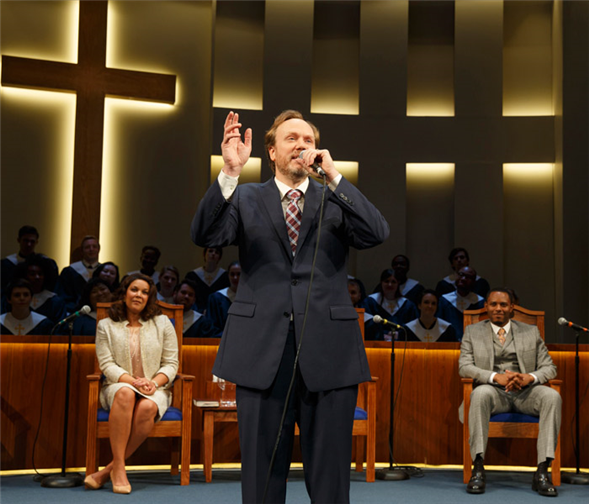Translate Page

Why Lucas Hnath wants everyone in The Christians on a mic
---
At first, the microphones seem perfectly normal. After all, Lucas Hnath's play The Christians, which is now at Playwrights Horizons, is set in a megachurch, with a choir of over 20 people watching as a pastor delivers a sermon to his flock. There among the attractive floral arrangements and the large screens projecting relevant Bible verses, it only makes sense that a man of God would need amplification to be heard.
But then the sermon ends, and he just keeps using the mic. In fact, every line in the play – which moves from the church stage to the pastor's bedroom and other private areas – is spoken into a hand-held microphone with a cord on it.
This adds several wrinkles to the story, which follows the aftermath of a sermon where the church leader, Pastor Paul, announces that he no longer believes in hell. As the congregation splinters – as Paul's followers, his colleagues, and even his wife struggle to decide if they agree with him – their conversations gain dramatic weight because they're magnified.
"There's something about the mics that sounds like the voice that's in your head," says Hnath. "So much of the play is about announcing one's thought process. Off-mic, it sounds like a long, rambling monologue. On-mic, it tips toward this feeling that the contents of somebody's brains are kind of spilling out."
The technique also stresses that every element of a religious leader's life can impact his or her congregation. "Being on mic makes you aware of the significance of what everybody's saying," Hnath explains. "I can even have a scene between the pastor and his wife at home, but if the scene is being played in the form of a church service and on mic, it occupies two spaces at once. It occupies the private space and then also the public space. As they talk, you can't forget how everything they talk about does matter outside their home. There is not a private life in this play, which I think is true for pastors."
{Image1}
Plus, actually seeing a microphone means we get a visual reminder that all the characters are choosing to express what they believe, even when it's potentially damaging to relationships they care about. As Hnath says, "It's a really text-heavy play, and the most dramatic action is the decision to say something. So when you have a mic, you can articulate that decision in different ways. It's different if you lean into the mic versus pulling the mic from the stand and taking a step downstage – or versus putting the microphone to your mouth and then putting it back down without saying anything."
It matters, too, that the microphones have cords, even though a real megachurch would be able to afford wireless devices. "We talked about cordless, and it's just too slick," Hnath says. "And headsets – Madonna mics – would be ultra-suspicious. It's important that we not give you any reason to be too quickly suspicious of the people up on stage. I think people in the audience, some of them, might be pretty quick to want to scoff at the people on stage, and I want to give them as few reasons as possible to feel that way."
The audience response matters because The Christians treats its characters and its subject very seriously. Even if we're not religious, we most certainly have a moral code, and the play asks all of us to investigate what that code is made of, why we need it to have those ingredients, and what we'd do if it were seriously challenged.
To keep us focused on those larger questions, the script rarely reference specific places or issues. We might learn, for instance, that the associate pastor who rebels against Paul's sermon once got teenage parishioners to protest with him, but we never learn exactly what they were protesting. "I could have had him leading protests at an abortion clinic, but if I had said 'abortion clinic,' then that hot-button topic suddenly becomes the subject of the play," Hnath says. "The issue that we're really focusing on is how faith works."
---
Mark Blankenship is the editor-in-chief of TDF Stages. Follow him @IAmBlankenship. Follow TDF @TDFNYC
Photos by Joan Marcus. Top photo: Andrew Garman (foreground) as Pastor Paul. Seated L to R: Linda Powell, Larry Powell, and Philip Kerr.